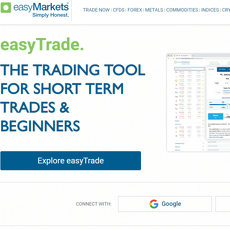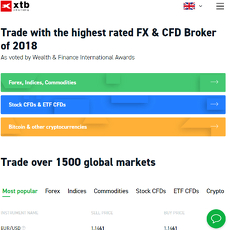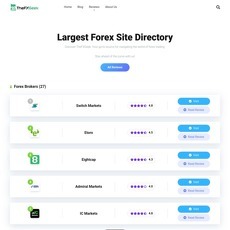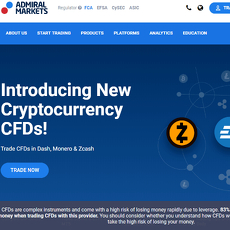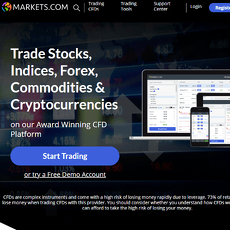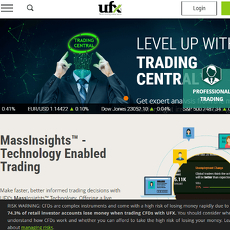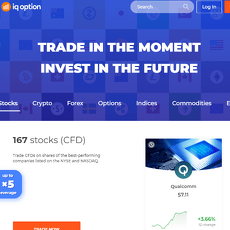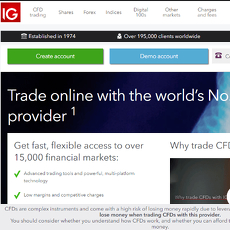Best Crypto CFD Trading Platforms (2026) – Bitcoin CFDs, Spreads & Fees
Bitcoin Cryptocurrency CFD and Futures Trading Review: Navigating the World of Digital Assets
Ever wondered how traders are capitalizing on Bitcoin's wild price swings without ever owning a single coin? I sure did when I first stepped into the crypto arena. As the owner of Cryptolinks.com, I've spent countless hours digging into various trading strategies. It turns out that Bitcoin CFDs and futures open up exciting possibilities for both beginners and seasoned traders. I'm eager to share what I've learned so you can decide if these trading avenues are right for you.
The Challenges of Traditional Bitcoin Trading
Trading Bitcoin directly isn't always a walk in the park. Remember the Mt. Gox hack back in 2014 where thousands of Bitcoins vanished? Security concerns like that can make holding actual Bitcoins nerve-wracking. Not to mention, setting up digital wallets and navigating through different exchanges can be overwhelming.
Plus, Bitcoin's price can swing dramatically in a single day. If you're not careful, you could see your investment plummet before you can react. It's no wonder some traders are hesitant to jump into traditional Bitcoin trading.
Looking for Better Trading Options
Personally, I started seeking alternatives that would allow me to tap into Bitcoin's price movements without the hassles of owning the cryptocurrency itself. That's when I came across CFDs and futures. They seemed like promising tools to engage with the crypto market more flexibly.
What You'll Discover Here
In this review, we'll explore:
- What Bitcoin CFDs and futures are all about
- The pros and cons of each trading method
- How you can get started with them
My aim is to equip you with valuable insights so you can make smart trading choices.
Curious to see how these trading methods might fit into your strategy?
Understanding Bitcoin CFD Trading
When I first stumbled upon Bitcoin CFDs, I felt like I'd discovered a secret doorway into the crypto market. Imagine being able to speculate on Bitcoin's wild price swings without the hassle of owning any actual coins. Sounds intriguing, right?
What Are CFDs?
Let me break it down. CFDs, or Contracts for Difference, are like shaking hands on a bet with your broker about where an asset's price is heading. You don't buy the asset itself; instead, you agree to exchange the difference in its price from when you open the contract to when you close it. It's kind of like cheering for your favorite team—you don't own the team, but you feel every win and loss.
How Bitcoin CFDs Work
With Bitcoin CFDs, you're essentially predicting whether Bitcoin's price will go up or down. If you think it's going to rise, you open a 'buy' position. If you believe it's headed south, you open a 'sell' position. The beauty is, you can profit from both market directions. I remember the thrill of my first successful trade—it was like I had a front-row seat to Bitcoin's rollercoaster without actually owning a single coin.
Pros and Cons of Bitcoin CFD Trading
Now, let's talk about the good and the not-so-good. On the plus side, CFDs offer leverage, meaning you can control a large position with a relatively small amount of money. This can amplify your profits—imagine turning a modest investment into a significant gain. But, and this is a big but, leverage is a double-edged sword. It can also magnify your losses.
There are also overnight fees, known as swap rates, if you hold positions longer than a day. These can eat into your profits if you're not careful. I learned this the hard way when I held onto a position a bit too long, thinking the market would turn in my favor. Lesson learned!
"Investing isn't about beating others at their game. It's about controlling yourself at your own game." – Benjamin Graham
This quote resonates with me because trading CFDs requires discipline and a clear strategy. It's easy to get caught up in the excitement, but staying focused is key.
Understanding these pros and cons helped me navigate the CFD landscape more confidently. It's a thrilling way to engage with Bitcoin's price movements, but it's essential to be aware of the risks involved.
If you're curious about another way to participate in the Bitcoin market without owning actual coins, there's more to explore. Ready to check out Bitcoin futures trading? Let's see what that's all about in the next section.
Exploring Bitcoin Futures Trading
After getting a handle on Bitcoin CFDs, I discovered there's another interesting way to engage with the crypto market without actually owning any coins—Bitcoin futures trading. At first, it might seem a bit complex, but once you get the hang of it, it can open up a whole new realm of possibilities.
What Are Futures Contracts?
The idea of futures contracts was unfamiliar to me initially. Simply put, a futures contract is an agreement to buy or sell an asset at a predetermined price on a set future date. Imagine agreeing today to purchase Bitcoin at $25,000 three months from now, regardless of what the market price will be then. It's like pre-ordering a concert ticket at a fixed price before it potentially sells out or increases in cost.
"The best way to predict the future is to create it." - Peter Drucker
This quote really hits home when thinking about futures trading. By entering into a futures contract, you're not just predicting where Bitcoin’s price will go—you’re actively setting the terms for your future trade.
How Bitcoin Futures Work
So how does this work in practice? When you trade Bitcoin futures, you're speculating on what Bitcoin's price will be at a specific point in the future. For example, if you believe that Bitcoin's price will rise over the next six months, you can enter a futures contract to buy Bitcoin at today's price, aiming to profit from the increase when the contract expires.
Let me share a real-world example. Back in late 2020, Bitcoin was hovering around $15,000. Some traders anticipated a bull run and entered into futures contracts to buy Bitcoin at that price, set to expire in early 2021. As it turned out, Bitcoin's price soared past $40,000 by January 2021. Those traders who "went long" on Bitcoin futures reaped significant profits without ever owning the actual Bitcoin during that period.
On the other hand, Bitcoin futures aren't just for those looking to profit from price increases. They're also useful for hedging. Suppose you're a Bitcoin miner concerned about potential price drops. You could sell futures contracts to lock in the current price, protecting yourself against future declines. This way, even if the market takes a downturn, the futures contract can offset some of the losses from the lower Bitcoin prices.
Pros and Cons of Bitcoin Futures Trading
Like any trading strategy, Bitcoin futures come with their own set of advantages and disadvantages.
Pros:
- No Overnight Fees: One thing I appreciate about futures is that they don't incur overnight financing charges like CFDs often do. This makes them more cost-effective for holding positions over longer periods.
- Leverage Opportunities: Futures contracts typically offer leverage, allowing you to control a large position with a smaller amount of capital. This can amplify your potential profits.
- Risk Management: Futures are great for hedging against price fluctuations. Businesses and investors use them to manage the risk associated with volatile markets.
- Regulated Exchanges: Bitcoin futures are often traded on regulated exchanges like the CME Group, providing a layer of security and transparency.
Cons:
- Fixed Expiration Dates: Futures contracts come with set expiration dates. If the market doesn't move in your favor before the contract expires, you could face losses.
- Higher Complexity: I'll be honest—futures can be complex, especially for beginners. Understanding contract specifications, margin requirements, and settlement procedures is crucial.
- Leverage Risks: While leverage can boost profits, it can also magnify losses. It's important to manage your risk and not overextend your positions.
- Potential for Margin Calls: If the market moves against your position, you may be required to add more funds to maintain your margin requirements.
According to data from CME Group, the average daily volume of Bitcoin futures has been growing steadily, indicating increasing interest and liquidity in the market. This growth provides traders with better opportunities for entering and exiting positions efficiently.
Feeling curious about how Bitcoin futures might fit into your trading plan? There's more to explore when it comes to choosing the right instrument for your goals. Ever wondered how futures stack up against CFDs and which one might be the better choice for you?
Bitcoin CFDs vs. Futures: Key Differences
When I first stepped into Bitcoin trading without actually owning the coins, I found myself torn between CFDs and futures. Both offer unique advantages, but figuring out which one suits your trading style can be a bit tricky. Let me share some insights that helped me navigate this decision.
Leverage and Margin Requirements
One of the first things I noticed was how leverage works differently with CFDs and futures. With CFDs, brokers often offer higher leverage ratios. This means you can control a larger position with a smaller amount of capital. It's exciting because it amplifies potential profits, but it also increases the risk of significant losses. I remember my first highly leveraged CFD trade—it was a thrill ride, but it taught me to respect the power of leverage.
On the flip side, futures contracts require an upfront margin deposit. This ties up more of your capital from the get-go. While this might seem like a downside, it can actually encourage more disciplined trading. You're investing more skin in the game, which might make you think twice before jumping into a risky position. For instance, trading Bitcoin futures on a regulated exchange like CME Group involves specific margin requirements that provide a structured trading environment.
Flexibility and Contract Terms
Flexibility is a big deal for me. CFDs offer the freedom to open and close positions whenever you please since they don't have expiration dates. This means you can react to market changes in real-time without worrying about contract expirations sneaking up on you. I've found this particularly useful during volatile market periods when timing is everything.
Futures contracts, however, come with set expiration dates. This can be both a blessing and a curse. On one hand, it allows for long-term strategic planning. On the other, if the market moves against you as the expiration date approaches, you might find yourself in a tough spot. I once held a futures position that was performing well until an unexpected market shift occurred just before expiration. It was a stark reminder of how contract terms can impact your trading strategy.
Fees and Costs
Nobody likes fees eating into their profits. With CFDs, one thing to watch out for is overnight financing charges if you hold positions open past the trading day. These fees can add up over time. I learned this the hard way after holding a CFD position for several weeks—the fees significantly reduced my overall gains.
Futures trading typically involves paying commissions, and the lack of flexibility can sometimes lead to higher costs. If the market moves against you before the contract expires, adjusting your position can be costly. For example, closing out or rolling over a futures contract might involve additional fees or unfavorable pricing, which can catch you off guard if you're not prepared.
"Risk comes from not knowing what you're doing." - Warren Buffett
This quote really hits home for me. Understanding the intricacies of fees and costs isn't just about saving money—it's about being fully informed so you can trade confidently.
Navigating these differences might seem overwhelming at first, but getting a handle on them is a crucial step in your trading journey. Curious about how to take this knowledge and put it into action? I have some tips coming up that helped me get started, and I think you'll find them useful too.
Starting with Bitcoin CFD Trading
So, you're intrigued by Bitcoin CFDs and wondering how to jump in? I've been there too, staring at the screen, unsure where to begin. Let me share what I've learned to help you get started on the right foot.
Choosing a CFD Broker
The first step is finding a reputable CFD broker. When I was starting out, I realized that not all brokers are created equal. It's crucial to look for brokers that are regulated and offer competitive spreads. Trust me, you'll want a platform that's not only secure but also user-friendly.
Consider brokers that provide:
- Regulatory oversight – This ensures your funds are protected.
- Low fees and spreads – Keeps trading costs down.
- Easy-to-use platforms – Simplifies the trading process, especially if you're new.
I can't stress enough how much a good platform can make a difference when you're starting out. It's like choosing a car; you want something reliable and comfortable for the journey ahead.
Opening and Managing Positions
Once you've picked a broker, it's time to get your hands dirty. But before risking real money, I always recommend starting with a demo account. It's a risk-free way to learn the ropes.
Here's what you can do:
- Practice opening positions – Get familiar with how trades are executed.
- Set stop-loss orders – This helps limit potential losses.
- Understand margin requirements – Know how much capital you need to maintain your positions.
Remember when I first tried trading without fully understanding margin? Let's just say it was a lesson learned the hard way. Taking the time to practice can save you from costly mistakes.
Managing Risks
Risk management isn't the most exciting topic, but it's arguably the most important. As the saying goes,
"It's not about how much you make, but how much you keep."
To protect your capital:
- Use stop-loss orders – These automatically close your position at a predefined level.
- Avoid over-leveraging – While leverage can amplify gains, it can also magnify losses.
- Diversify your trades – Don't put all your eggs in one basket.
I've seen traders wiped out because they ignored these principles. Don't let that be you. Treat risk management as your trade's safety net.
Now that you've got a handle on starting with Bitcoin CFDs, you might be wondering how futures trading stacks up. Is it a better fit for your trading style? In the next section, we'll explore how to get into Bitcoin futures trading and what you need to know to succeed. Stay tuned!
Getting into Bitcoin Futures Trading
When I first stepped into the world of Bitcoin futures, I felt like I was unlocking a new level of understanding in crypto trading. If you're excited about planning ahead and leveraging market movements, futures trading might be the next frontier for you.
Selecting a Futures Exchange
Choosing the right platform is a crucial first step. I remember sifting through various exchanges, trying to find one that was trustworthy and aligned with my trading style. You'll want to select an exchange that offers Bitcoin futures and has a solid reputation in the industry. Some well-known options include CME Group and Bakkt.
Here are some factors to consider when selecting a futures exchange:
- Regulation and Security: Ensure the exchange operates under strict regulatory standards and employs robust security measures to protect your funds.
- Trading Fees: Compare fee structures to understand how they might impact your profitability.
- Liquidity: Higher liquidity means you can enter and exit positions more easily without slippage.
- User Experience: A user-friendly interface can make a huge difference, especially when you're managing multiple trades.
Taking the time to research will give you peace of mind and set you up for smoother trading experiences down the line.
Understanding Contract Specifications
Diving into futures trading without grasping the contract details is like embarking on a journey without a map. Each futures contract comes with specific terms that you need to know:
- Contract Size: This indicates how much Bitcoin the contract represents. For instance, CME's Bitcoin futures contract represents five Bitcoins, which can significantly impact your exposure.
- Expiration Dates: Futures contracts have set expiration dates, usually monthly or quarterly. Knowing these dates helps you plan when to close or roll over your positions.
- Margin Requirements: You'll need to maintain a certain amount of capital in your account, known as the margin, to open and hold positions.
Understanding these specifications not only helps you avoid unexpected surprises but also allows you to strategize effectively. As Benjamin Franklin wisely said:
"By failing to prepare, you are preparing to fail."
This insight hits home in futures trading, where knowledge truly is power.
Managing Futures Positions
Trading futures can be a rollercoaster of emotions. I still recall the adrenaline rush of my first big win and the lessons learned from my losses. Managing your positions carefully is key to long-term success.
Here are some tips that have guided me:
- Develop a Trading Plan: Define your goals, risk tolerance, and strategy before entering the market. Are you hedging or speculating? Your approach will differ accordingly.
- Utilize Risk Management: Implement stop-loss and take-profit orders to protect your capital. Never risk more than you can afford to lose.
- Stay Educated: The crypto market evolves rapidly. Keep learning and adapting your strategies as new trends and information emerge.
Trading futures isn't just about making quick profits; it's about disciplined execution of a well-thought-out plan. The complexities can be daunting, but with the right preparation, you're more likely to navigate the challenges successfully.
Embarking on futures trading opens up a new realm of possibilities in the crypto market. But to truly make the most of it, aligning yourself with the right broker can make all the difference.
So, how do you find a broker that's the perfect fit for your trading journey?
Choosing the Best Broker for Bitcoin CFDs and Futures
When I first ventured into Bitcoin CFDs and futures trading, I quickly realized that not all brokers are created equal. Finding the right one felt like looking for a needle in a haystack, but it's a crucial step that can make or break your trading experience.
Factors to Consider
Selecting a broker isn't just about low fees or fancy platforms; it's about finding a partner you can trust on your trading journey. Here are some key factors I always keep in mind:
- Regulation: Ensure the broker is regulated by reputable financial authorities. This adds a layer of security and trust.
- Fees: Be mindful of all the fees involved, including spreads, commissions, and any hidden charges.
- Platform Usability: A user-friendly platform can make trading smoother, especially when you're monitoring volatile markets like crypto.
- Customer Support: Reliable customer service is essential. You want to know that help is available when you need it.
As the saying goes, "A good broker is like a good friend—reliable, trustworthy, and always there when you need them." I've learned that it's worth taking the time to find one that fits your needs.
Top Brokers to Consider
Over the years, I've tried several brokers and these are a few that have stood out:
- Charles Schwab: Offers Bitcoin futures trading with a solid reputation and strong regulatory oversight.
- eToro: Great for CFDs with a user-friendly platform and social trading features that let you follow and copy other traders.
- IG: A well-established broker offering a wide range of CFDs, including Bitcoin, with competitive fees.
Remember, what works for me might not be the perfect fit for you. It's important to do your own research and perhaps test out a few platforms to see which one feels right.
Choosing the right broker is a significant step, but it's just one piece of the puzzle. Curious about the strategies that can help you succeed in this dynamic market?
Strategies for Successful Bitcoin CFD and Futures Trading
When I first started trading Bitcoin CFDs and futures, I quickly realized that having a solid strategy was the difference between chasing losses and making consistent gains. Let me share some of the approaches that have worked for me and might help you navigate this thrilling yet volatile market.
Technical Analysis
I've found that technical analysis is like having a roadmap in the often chaotic world of cryptocurrency trading. By studying charts and utilizing indicators, I can spot trends and potential turning points in Bitcoin's price. For instance, using moving averages helps me identify whether the market is in an uptrend or downtrend, while indicators like the Relative Strength Index (RSI) clue me in on whether Bitcoin is overbought or oversold.
One time, I noticed a classic "head and shoulders" pattern forming on the Bitcoin chart. Trusting my analysis, I opened a short position on a CFD, and sure enough, the price dropped, resulting in a profitable trade. Technical analysis doesn't guarantee success every time, but it significantly improves the odds by providing insights into market behavior.
Risk Management Techniques
Early on, I learned the hard way that ignoring risk management can wipe out your trading account faster than you can say "blockchain." Now, I always set stop-loss orders to limit potential losses. For example, if I'm entering a trade, I determine the maximum amount I'm willing to lose and set a stop-loss at that price level.
Another technique I use is position sizing. I never risk more than a small percentage of my trading capital on a single trade. This approach protects me from significant losses if the market moves against me. Remember, leveraging can amplify both gains and losses, so it's crucial to keep emotions in check and stick to your risk management plan.
Staying Informed
The cryptocurrency market moves at lightning speed, and staying informed has given me an edge time and again. I make it a habit to follow reputable crypto news outlets and join online communities where traders share insights. For instance, when major companies announce they are accepting Bitcoin, the price often reacts positively. On the other hand, regulatory crackdowns can send prices tumbling.
By keeping an eye on news events, I've been able to anticipate market movements. Once, after reading about impending regulatory changes in a major economy, I adjusted my positions accordingly, which helped me avoid potential losses. Information is power, especially in markets as dynamic as crypto.
Embracing these strategies has transformed my trading experience, but there's always more to uncover. Wondering how to choose the path that best aligns with your trading ambitions? We'll explore that in the next part.
Making the Right Choice for Your Trading Journey
After exploring both Bitcoin CFDs and futures, you might be wondering which path is right for you. I've been in your shoes, weighing the pros and cons, and trying to figure out the best way forward. Let's take a moment to reflect on your trading goals and see how you can make an informed decision.
Assessing Your Trading Goals
The first step is to ask yourself: What am I aiming to achieve in the cryptocurrency market? Are you looking to capitalize on short-term price movements, or are you interested in longer-term positions?
If you're inclined towards short-term trading and prefer flexibility, CFDs might be more suitable. They allow you to open and close positions without worrying about contract expirations. I remember when I first started, the ability to trade swiftly was a game-changer for me.
On the other hand, if you're planning for the long haul and want to lock in prices for future transactions, futures contracts could be the way to go. They offer a structured approach, which can be beneficial if you have a specific market outlook.
Consider also your risk tolerance. CFDs often come with higher leverage, amplifying both potential gains and losses. Futures require upfront margin deposits, which might tie up more capital but could provide a sense of security due to standardized regulations.
Taking the Next Steps
Once you've got a clearer picture of your goals, it's time to take action. Here's how you can move forward:
- Educate Yourself: Knowledge is power. Continue learning about the specifics of CFDs or futures, depending on your choice. There are plenty of resources available, including tutorials, webinars, and online courses.
- Choose a Reputable Platform: Whether it's a broker for CFDs or an exchange for futures, make sure it's regulated and suits your needs. Read reviews, ask for recommendations, and don't hesitate to reach out to customer support with any questions.
- Start Small: I can't stress this enough. Begin with small positions to get a feel for the market. Even if you're confident, the crypto market can be unpredictable. Starting small helps you manage risk while you gain experience.
- Practice Risk Management: Use stop-loss orders and set clear limits on how much you're willing to risk on each trade. This has saved me from significant losses more times than I can count.
- Stay Updated: Keep an eye on market news and trends. Follow reputable crypto news sources, join forums, or even set up alerts for important market events.
Final Thoughts
Embarking on your Bitcoin trading journey can be both exciting and daunting. Trust me, I've been there. But with the right approach and mindset, it can be incredibly rewarding. Remember, there's no one-size-fits-all solution. What works for someone else might not be the best for you.
Take the time to understand your preferences, learn from your experiences, and don't be afraid to adjust your strategies along the way. The world of cryptocurrency is ever-changing, and staying adaptable is key.
I'm rooting for your success. Whether you choose CFDs, futures, or a combination of both, the most important thing is that you're taking proactive steps towards achieving your trading goals. Stay curious, stay cautious, and most importantly, enjoy the journey.
Good luck, and happy trading!



